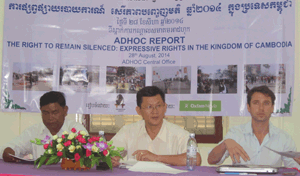Civil Society’s Concerns Regarding a Positive Legacy for the ECCC
Phnom Penh, 24 April 20010: Our organizations are both Cambodian and international non-profit institutions that have supported the work of the ECCC since it began its operations in 200[6]. In particular, we have: (i) monitored the tribunal, to ensure it upholds international fair trial standards, (ii) focused efforts on outreach activities around the court’s proceedings, to maximize the domestic impact of the proceedings, and (iii) advocated strongly for, and supported, a credible victims and civil party participation process, to enable the ECCC to fulfill its mandate, as determined by the judges through the Court’s Internal Rules.
While we have been very pleased to date, to see the Court achieve important milestones in its history, we wish to draw your attention to some key concerns we consider of pressing importance to the ongoing success of the Extraordinary Chambers.
First, we are concerned that at present, there has been no assurance of continued support for the tribunal to the extent that the ECCC has indicated is necessary for it to successfully complete its mandate. As friends of the ECCC, we would urge your assistance in securing funding for this purpose. Although the case of Prosecutor v Kaing Guek Eav alias ‘Duch’ marked a major success for the tribunal, in order for the ECCC to maintain both its credibility as an institution and remain meaningful to victims, it is imperative that the Court is able to continue its work in the administration of justice within Cambodia.
Second, we are disappointed that as yet, there has been no appointment of a much-needed Special Adviser for the tribunal. While we understand that such appointments take time, time is of the essence at the ECCC. Although the tribunal is currently ‘in between’ public proceedings, efforts to ensure it achieves a positive legacy in Cambodia need to begin in earnest now. This includes ensuring the ongoing negotiation and coordination between the United Nations and the Royal Government of Cambodia on a number of critical issues, including the conduct of further investigations beyond Case 002. The absence of a clearly formulated completion strategy, reflecting the consensus of the United Nations, donors and the Government on the future direction of the Court, threatens to negatively impact on the independence and fairness of the justice process. We strongly suggest that the friends of the ECCC join with us in promoting the speedy appointment of the Special Adviser to strengthen the capacity in finding an expeditious resolution of these and other critical issues.
Finally, we would like to draw your attention to the fact that many local non-governmental organizations themselves are lacking financial support for their present and future ECCC-related activities. In particular, these activities include projects that have been pivotal to the success of outreach and the Court’s victims participation process – both areas of activity have received vital donor support during the ECCC’s early stages. Without further support for the work of NGOs in this regard, they may be forced to cease their support of the work of the Court, as they will not have the means to do so. Given the extent to which the NGOs have fostered the grass-roots involvement in the tribunal to date, including facilitating the participation of more than 8,000 victims currently seeking legal status in Case 002, this would seem in the eyes of many Cambodians to do great harm to the future process of the ECCC.
At this critical stage in the ECCC’s history, on the eve of the Court’s second and most important trial, it is essential that much needed support for the institution is forth-coming, lest the sceptics be proved right, and the tribunal ultimately be considered a farce in the eyes of Cambodians and the international community. The victims of the Khmer Rouge have waited thirty years for justice: it would seem a great shame if yet again; they were denied it, due to a misplaced fatigue towards what was always going to be a long and difficult process.
We wish to thank the Friends for considering our concerns and for your ongoing support of the ECCC – an institution that we believe continues to play an important part in Cambodia’s transition from a post-conflict state to a peaceful and just society. With your help, ongoing guidance and leadership, we are certain the tribunal will prove to be a success.
Yours faithfully,
| Signatory |
Position/Organization |
Mobile |
| 1. Mr. HANG Chhaya | Executive Director of the Khmer Institute of Democracy (KID) and Chairman of the Cambodian Human Rights Action Committee (CHRAC) [1] | 012 865910
|
| 2. Mr. THUN Saray | President of the Cambodian Human Rights & Development Association (ADHOC) | 016 880509
|
| 3. Mr. SOK Sam Oeun | Executive Director of the Cambodian Defenders’ Project (CDP) | 012 901199
|
| 4. Mr. IM Sophea | Co-Director of the Center for Justice and Reconciliation (CJR) | 077 777367
|
| 5. Mr. RUN Saray | Executive Director of Legal of Aid of Cambodia (LAC) | 012 838341 |
| 6. Ms. Michelle Staggs | Asian International Justice Initiative (AIJI) | 089 645415 |
| 7.Mr.LONG Panhavuth | Program Coordinator of the Cambodia Justice Initiative (CJI) | 012 843647
|
[1] CHRAC is a coalition on 23 NGOs members working on the fields on human rights, democracy and legal aid in Cambodia.
___________________________
Cambodian Human Rights Action Committee (CHRAC)
Address: # 9E0, St. 330, Sangkat Boeung Keng Kong III,
Khan. Chamcar Morn, Phnom Penh, Cambodia
Tel/Fax: 855 23 218 759 , Tel: 855 23 301 415 , 305 609
E-mail: chrac@forum.org.kh or chracsecretariat@yahoo.com
Web: http://www.chrac.org

